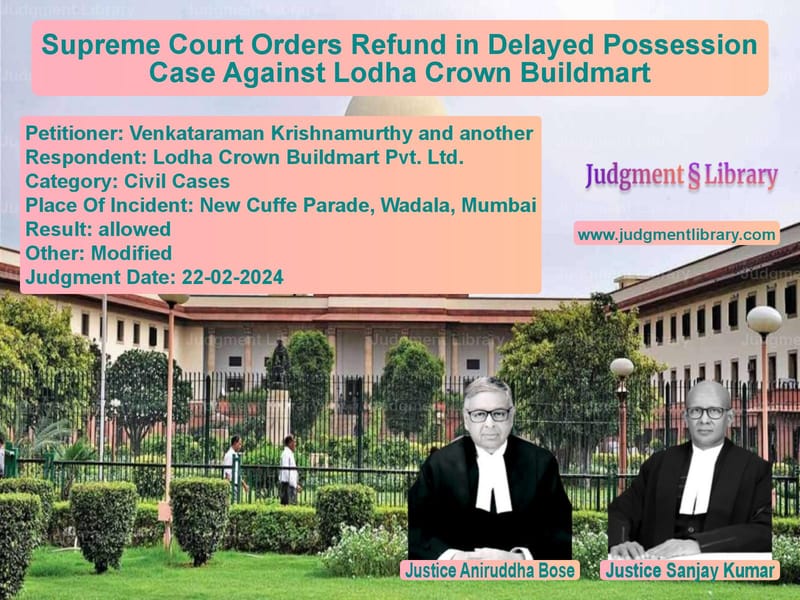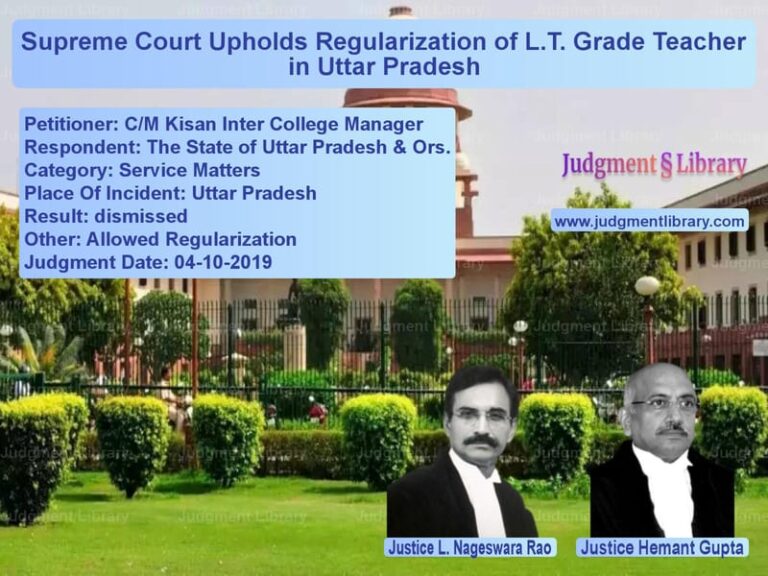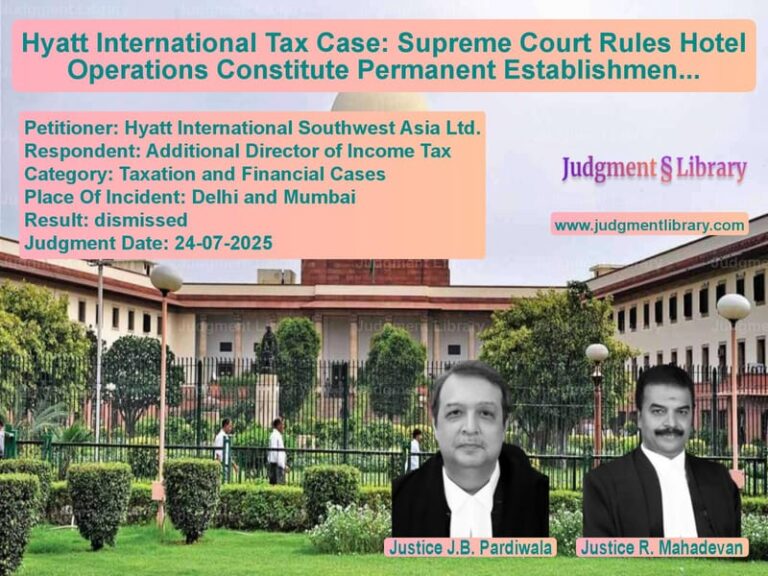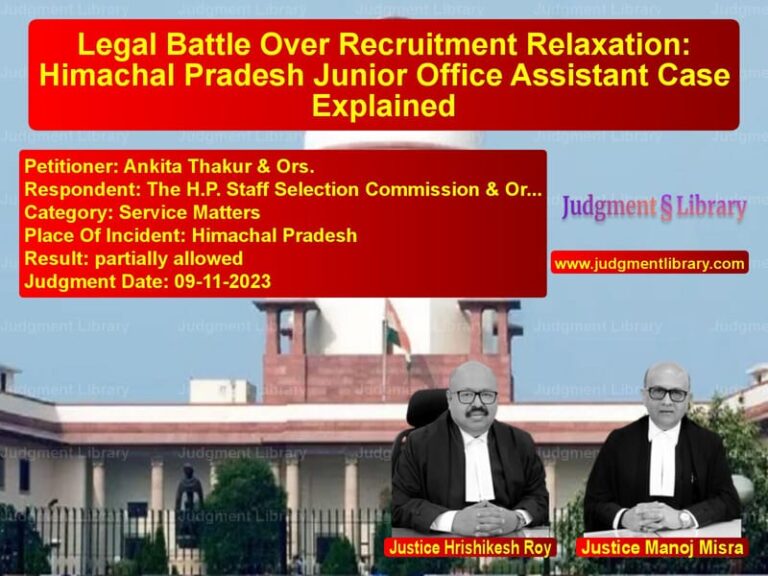Supreme Court Orders Refund in Delayed Possession Case Against Lodha Crown Buildmart
The Supreme Court, in Venkataraman Krishnamurthy and another v. Lodha Crown Buildmart Pvt. Ltd., ruled in favor of the homebuyers, directing the refund of their deposited amount along with 12% simple interest per annum. The judgment reinforces homebuyers’ rights against delayed possession in real estate transactions and upholds contractual obligations.
Background of the Case
The appellants, Venkataraman Krishnamurthy and another, entered into an Agreement to Sell on November 29, 2013, for purchasing a 4BHK apartment in ‘Lodha Evoq’, New Cuffe Parade, Wadala, Mumbai. The agreed sale consideration was ₹7,55,50,956. The appellants made payments totaling ₹2,25,31,148 by the time they approached the National Consumer Disputes Redressal Commission (NCDRC), alleging failure by the developer to deliver possession as per the agreement.
As per the contract, possession for fit-outs was scheduled for June 30, 2016, with a grace period extending to June 30, 2017. However, when possession was not offered within this period, the appellants opted to terminate the agreement and sought a refund with 18% interest per annum. The NCDRC ruled in favor of possession delivery but imposed certain deductions for refund claims.
Key Legal Issues
- Whether the homebuyers had the right to terminate the agreement due to delayed possession.
- Whether the developer was justified in refusing a full refund.
- Whether the possession certificate issued was legally valid.
- Whether NCDRC had the authority to modify contractual terms in a consumer dispute.
Petitioner’s (Homebuyers’) Arguments
- The developer failed to offer possession within the agreed timeframe, making them eligible for termination and full refund.
- The ‘Part Occupancy Certificate’ issued on June 8, 2017, was not equivalent to a final ‘Occupancy Certificate’, as required under the agreement.
- The NCDRC erroneously modified the terms of the contract by permitting deductions for refunds.
- They exercised their right to terminate within the contractual 90-day period after the grace period expired.
Respondent’s (Developer’s) Arguments
- The delay was minor, and homebuyers could not seek termination based on ‘unreasonable delay’.
- The Part Occupancy Certificate was sufficient to establish possession availability.
- The homebuyers were looking to avoid paying the newly introduced GST liability.
- The NCDRC’s decision was fair and reasonable in allowing deductions.
Supreme Court’s Observations
The Bench, comprising Justices Aniruddha Bose and Sanjay Kumar, critically analyzed the contract terms and made key observations:
- “The agreement clearly provided that possession for fit-outs was to be given by June 30, 2017, failing which the appellants had the right to terminate and seek a refund.”
- “A ‘Part Occupancy Certificate’ is not equivalent to a full Occupancy Certificate and does not constitute a valid possession offer.”
- “The NCDRC erred in modifying contractual refund terms without legal justification.”
- “The homebuyers acted within their rights by issuing a termination notice immediately after the grace period ended.”
Key Legal Findings
- The delay beyond June 30, 2017, justified contract termination by the homebuyers.
- The Part Occupancy Certificate did not satisfy the requirement of a full Occupancy Certificate.
- Homebuyers were entitled to a full refund as per the agreement.
- The NCDRC overstepped its jurisdiction by altering refund provisions beyond the contract terms.
Final Judgment
The Supreme Court ruled:
“The NCDRC’s order dated November 9, 2022, is set aside. The respondent shall refund ₹2,25,31,148 to the appellants in 12 equal monthly installments with simple interest at 12% per annum from the date of payment till actual repayment.”
The developer was directed to issue post-dated cheques for monthly installments, with the first due on April 5, 2024.
Key Takeaways from the Judgment
- Delayed possession entitles homebuyers to terminate agreements and claim a refund.
- Occupancy Certificates must be final and complete before developers can claim readiness for possession.
- Consumer courts cannot unilaterally modify refund conditions in property agreements.
- Refunds must be paid with interest when developers fail contractual obligations.
Impact of the Judgment
This ruling strengthens homebuyer protections by:
- Ensuring developers adhere strictly to agreed possession timelines.
- Preventing misuse of Part Occupancy Certificates to justify possession offers.
- Discouraging developers from imposing unjust deductions in refund cases.
- Providing a clear precedent for refund claims in delayed possession cases.
Conclusion
The Supreme Court’s decision in Venkataraman Krishnamurthy and another v. Lodha Crown Buildmart Pvt. Ltd. reinforces contractual obligations in real estate transactions. By restoring the homebuyers’ right to terminate and claim a full refund, the Court has safeguarded consumer interests and established a strong precedent against developer delays. This ruling ensures fairness in real estate dealings and discourages unjustified retention of buyers’ money by developers.
Petitioner Name: Venkataraman Krishnamurthy and another.Respondent Name: Lodha Crown Buildmart Pvt. Ltd..Judgment By: Justice Aniruddha Bose, Justice Sanjay Kumar.Place Of Incident: New Cuffe Parade, Wadala, Mumbai.Judgment Date: 22-02-2024.
Don’t miss out on the full details! Download the complete judgment in PDF format below and gain valuable insights instantly!
Download Judgment: venkataraman-krishna-vs-lodha-crown-buildmar-supreme-court-of-india-judgment-dated-22-02-2024.pdf
Directly Download Judgment: Directly download this Judgment
See all petitions in Property Disputes
See all petitions in Damages and Compensation
See all petitions in Judgment by Aniruddha Bose
See all petitions in Judgment by Sanjay Kumar
See all petitions in allowed
See all petitions in Modified
See all petitions in supreme court of India judgments February 2024
See all petitions in 2024 judgments
See all posts in Civil Cases Category
See all allowed petitions in Civil Cases Category
See all Dismissed petitions in Civil Cases Category
See all partially allowed petitions in Civil Cases Category







